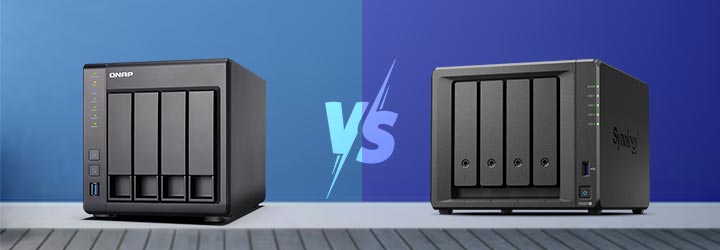
QNAP vs Synology: Which NAS Server You Should Choose?
Are you buying your first NAS or Network Attached Storage? Well, it we understand how hard choosing the best one can be. This is the reason we have penned down this blog post. Here, we have laid a comparison of QNAP vs Synology. Although both of them are very recognizable brands in the NAS space, however, sometimes, deciding between them can become a big task. To help yourself, you should walk through the information given below.
QNAP vs Synology: The Comparison
Operating System
Synology OS: DiskStation Manager
The OS in the case of Synology is known as DiskStation Manager. You can access by executing the Synology login process. Although it may look quite basic, however, it is very same to a fully-fledged OS. Are you using Windows? Well, you will be glad to know that using the DS manager is quite similar.
It is known to offer a user-friendly network and sharing management features. Trust us; you will experience no issues in setting up a custom network configuration with the Synology device. It also comes equipped with a package manager. It is known to permit one to choose from the results of approved application that needs to be installed.
QNAP OS: QNAP Turbo Station QTS
Linksys the OS of Synology, the OS of QNAP is also Linux-based. However, if we are taking in terms of design, then it seems to go for a mobile OS + MAC OS. By many users, QTS has been proved to be more comprehensive as compared to DSM. This means that beginners will find managing this NAS a lot harder.
To specify this more, the terminology of QTS is technical. In case you want to manage your NAS with the help of this OS, then it is recommended that you pay attention to some basic level networking in order your get your hands on the necessary skills.
Essential Features
Another department that will help you to decide whether you should for QNAP or Synology is the features that both of them provide. Continue reading and find out if the services provided below on NAS 1 or NAS 2:
Media
Plex is supported by not just Synology but also QNAP. It is known to be the most used home media center app. It works on more than one, as in multiple devices.
Backup Services
QNAP requires you to find the app that is right for you or is known to use a one-click backup button. However, Synology users the Hyper Backup took in order to backup data.
Virtual Machines
Again VMs is supported by both QNAP and Synology NAS. QNAP used Container Station whereas Synology is known to use Docker.
Future Proofing
One of the topmost things to notice about both the NAS devices is that they come with specific drive capacities. This means that for home or small office users, the capacity would be between four drive bays. But, what if you require more space?
Unless you are thinking about removing your existing drives away and buying bigger ones, then Synology should be chosen here. They offer about two expansion units which are compatible with their standard home NAS devices. These can quickly beef up your storage drive capacity by an extra 5 to 12 drive bays.
While QNAP also offers expansion units, these are for the enterprise market. They won’t work for home or small office use – unless you plan to install some server racks.
Verdict: Synology Wins
There is no doubt about the fact that Synology as well as QNAP are known to provide a wide range of NAS devices. However, this is mainly when it comes to the technical specifications. Synology DSM is known to offer a streamlined experience as the same time while it is retaining strong features. It also has a better potential for upgrading.
Given this, you should do Synology NAS login and set up the Synology NAS system in your house. Want to learn how the process can be gone about? Well then, take our advice and walk through the information given in the user manual of the NAS system. In the manual, you will also become aware of other related topics.
For your information, whenever you will be out in the market, shopping for the best NAS device, then it is recommended that you choose one out of these: Synology DS220J, Synology DS420+ and Synology DS1621+.
